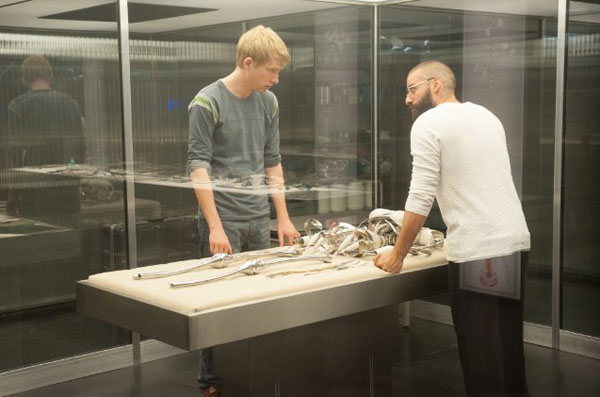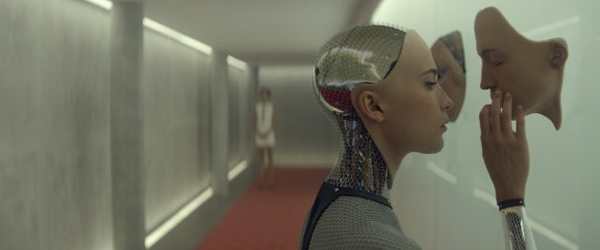
The beginning of this blockbuster season is proving to be a good one. Amidst the universally loved dual behemoths of Furious 7 and the second Avengers, a couple of lower-budget genre pieces have had the fortune of seeing a nationwide release due to their early, much-deserved critical acclaim. The first, It Follows, which I reviewed last month, was a sublime and smart distillation of the sexual anxiety of ’80s slasher flicks. The second is Ex Machina, a sublime and smart distillation of the Skynet anxiety of every sci-fi flick about artificial intelligence ever made.
Caleb (Domhnall Gleeson, whose role in the BBC’s techno-related drama Black Mirror now seems ironic) is an employee at the world’s largest tech company, BlueBook. He wins the company lottery and is rewarded with a Wonka-esque week-long stay at the reclusive CEO’s remote wooded estate. After a helicopter drop-off and a walk along the river, a female-voiced security system grants Caleb access to the retro-future-rustic compound where he finds his boss, Nathan (Oscar Isaac), pummeling a punching bag on the patio. Nathan (Oscar Isaac) introduces himself and instructs Caleb to see if Nathan’s latest AI can pass the Turing test (confirming a machine’s ability to exhibit human-type intelligence).
Writer/director Alex Garland, author of 28 Days Later and Dredd, makes his debut as a feature director with Ex Machina. His script is both lean and loose, exhibiting a concise naturalism brought to life by the three excellent leads, while his cinematographer and set designer perfectly capture the yin and yang of Nathan’s estate—both wooded and sterile, vast and claustrophobic. The inhabitant(s) of the estate enhance the uneasiness of Caleb’s situation. As his boss Nathan, Oscar Isaac is an unknown variable, an eccentric genius in bro’s skin. Often sweaty, often drunk, one moment seemingly willfully stupid, the next soberingly insightful, Isaac plays Nathan like an unhinged god-child. Caleb can only kowtow and eggshell-step for so long, as his interviews with Nathan’s AI, Ava, take an unsettling turn.
Ava. I’ve saved her for last, because though she is the sun around which this story revolves, she is also at the heart of the film’s most problematic element. Alicia Vikander passes whatever the opposite of the Turing test is for humans pretending to be robots. Combined with near-flawless special effects, her micro-expressions embody the blurred line between AI and just I. That said, while Ava may pass the Turing test, Ex Machina seriously fails the Bechdel test, and is in that regard a fatally flawed tale of two men and their robot woman. Like Spike Jones’ Her, Ex Machina is a thought-provoking, entertaining, and forward-thinking examination of real technological issues viewed through a sci-fi lens, but with a Fembot problem that is stuck in the past.















